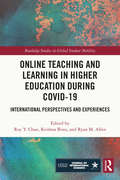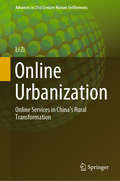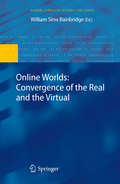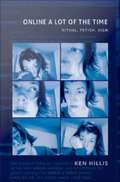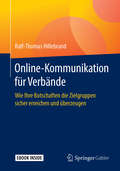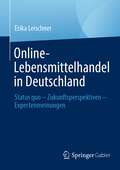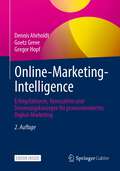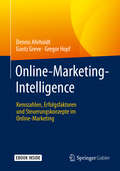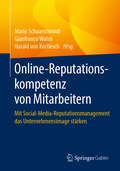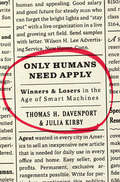- Table View
- List View
Online Teaching and Learning in Higher Education during COVID-19: International Perspectives and Experiences (Routledge Studies in Global Student Mobility)
by Krishna Bista Roy Y. Chan Ryan M. AllenThis timely volume documents the immediate, global impacts of the coronavirus pandemic (COVID-19) on teaching and learning in higher education. Focusing on student and faculty experiences of online and distance education, the text provides reflections on novel initiatives, unexpected challenges, and lessons learned. Responding to the urgent need to better understand online teaching and learning during the COVID-19 pandemic, this book investigates how the use of information and communication technologies (ICT) impacted students, faculty, and staff experiences during the COVID-19 lockdown. Chapters initially look at the challenges faced by universities and educators in their attempts to overcome the practical difficulties involved in developing effective online programming and pedagogy. The text then builds on these insights to highlight student experiences and consider issues of social connection and inequality. Finally, the volume looks forward to asking what lessons COVID-19 can offer for the future development of online and distance learning in higher education. This engaging volume will benefit researchers, academics, and educators with an interest in online teaching and eLearning, curriculum design, and more, specifically those involved with the digitalization of higher education. The text will also support further discussion and reflection around pedagogical transformation, international teaching and learning, and educational policy more broadly.
Online Teaching at Its Best: Merging Instructional Design with Teaching and Learning Research
by Linda B. Nilson Ludwika A. GoodsonBring pedagogy and cognitive science to online learning environments Online Teaching at Its Best: Merging Instructional Design with Teaching and Learning Research, 2nd Edition, is the scholarly resource for online learning that faculty, instructional designers, and administrators have raved about. This book addresses course design, teaching, and student motivation across the continuum of online teaching modes—remote, hybrid, hyflex, and fully online—integrating these with pedagogical and cognitive science, and grounding its recommendations in the latest research. The book will help you design or redesign your courses to ensure strong course alignment and effective student learning in any of these teaching modes. Its emphasis on evidence-based practices makes this one of the most scholarly books of its kind on the market today. This new edition features significant new content including more active learning formats for small groups across the online teaching continuum, strategies and tools for scripting and recording effective micro-lectures, ways to integrate quiz items within micro-lectures, more conferencing software and techniques to add interactivity, and a guide for rapid transition from face-to-face to online teaching. You’ll also find updated examples, references, and quotes to reflect more evolved technology. Adopt new pedagogical techniques designed specifically for remote, hybrid, hyflex, and fully online learning environments Ensure strong course alignment and effective student learning for all these modes of instruction Increase student retention, build necessary support structures, and train faculty more effectively Integrate research-based course design and cognitive psychology into graduate or undergraduate programs Distance is no barrier to a great education. Online Teaching at Its Best provides practical, real-world advice grounded in educational and psychological science to help online instructors, instructional designers, and administrators deliver an exceptional learning experience even under emergency conditions.
Online Teaching in the Digital Age
by Patricia Jane Swenson Nancy Annette TaylorThe essential guide to teaching in a virtual environmentOnline Teaching in the Digital Age provides educators with the essential knowledge needed to successfully develop and teach an online course. Throughout this practical hands-on guide, the authors offer 15 years of personal online teaching experience in language accessible to both the novice and advanced online educator. Developed through theory and practice, the text shows educators how to take the materials used in a traditional classroom and transfer them to a new virtual environment. Additionally, it gives educators the confidence and skills needed to run real-time (synchronous) and time-arranged (asynchronous) online discussions. Most reassuring of all, this book shows that few traditional course elements need to change in order to start teaching online.
Online Terrorist Propaganda, Recruitment, and Radicalization
by John R. VaccaOnline Terrorist Propaganda, Recruitment, and Radicalization is most complete treatment of the rapidly growing phenomenon of how terrorists’ online presence is utilized for terrorism funding, communication, and recruitment purposes. The book offers an in-depth coverage of the history and development of online "footprints" to target new converts, broaden their messaging, and increase their influence. Chapters present the emergence of various groups; the advancement of terrorist groups’ online presences; their utilization of video, chat room, and social media; and the current capability for propaganda, training, and recruitment. With contributions from leading experts in the field—including practitioners and terrorism researchers—the coverage moves from general factors to specific groups practices as relate to Islamic State of Iraq and the Levant (ISIL), and numerous other groups. Chapters also examine the lone wolf phenomenon as a part of the disturbing trend of self-radicalization. A functional, real-world approach is used regarding the classification of the means and methods by which an online presence is often utilized to promote and support acts of terrorism. Online Terrorist Propaganda, Recruitment, and Radicalization examines practical solutions in identifying the threat posed by terrorist propaganda and U.S. government efforts to counter it, with a particular focus on ISIS, the Dark Web, national and international measures to identify, thwart, and prosecute terrorist activities online. As such, it will be an invaluable resources for intelligence professionals, terrorism and counterterrorism professionals, those researching terrorism funding, and policy makers looking to restrict the spread of terrorism propaganda online.
Online Urbanization: Online Services in China’s Rural Transformation (Advances in 21st Century Human Settlements)
by Li ZiThis book highlights the new urban–rural relationship that has emerged under the influence of e-commerce in China. In this regard, it presents case studies on the Suichang rural e-commerce model and Alibaba’s rural strategy, together with analyses of online service in China. Furthermore, by means of a brief review of the urban–rural relationship throughout China’s history, and of academic literature on the study of space, it explains the special logic of urbanization in China. As such, the book makes a valuable contribution to the body of literature on the space of flows and grassrooting, aspects that are essential to appreciating the complexity of the new urban–rural relationship in underdeveloped areas (including developing countries and underdeveloped areas in developed countries) in the ongoing information era.
Online Visual Tracking
by Huchuan Lu Dong WangThis book presents the state of the art in online visual tracking, including the motivations, practical algorithms, and experimental evaluations. Visual tracking remains a highly active area of research in Computer Vision and the performance under complex scenarios has substantially improved, driven by the high demand in connection with real-world applications and the recent advances in machine learning. A large variety of new algorithms have been proposed in the literature over the last two decades, with mixed success.Chapters 1 to 6 introduce readers to tracking methods based on online learning algorithms, including sparse representation, dictionary learning, hashing codes, local model, and model fusion. In Chapter 7, visual tracking is formulated as a foreground/background segmentation problem, and tracking methods based on superpixels and end-to-end deep networks are presented. In turn, Chapters 8 and 9 introduce the cutting-edge tracking methods based on correlation filter and deep learning. Chapter 10 summarizes the book and points out potential future research directions for visual tracking. The book is self-contained and suited for all researchers, professionals and postgraduate students working in the fields of computer vision, pattern recognition, and machine learning. It will help these readers grasp the insights provided by cutting-edge research, and benefit from the practical techniques available for designing effective visual tracking algorithms. Further, the source codes or results of most algorithms in the book are provided at an accompanying website.
Online Worlds: Convergence of the Real and the Virtual
by William Sims BainbridgeVirtual worlds are persistent online computer-generated environments where people can interact, whether for work or play, in a manner comparable to the real world. The most popular current example is World of Warcraft, a massively multiplayer online game with eleven million subscribers. However, other virtual worlds, notably Second Life, are not games at all but internet-based collaboration contexts in which people can create virtual objects, simulated architecture, and working groups. This book brings together an international team of highly accomplished authors to examine the phenomena of virtual worlds, using a range of theories and methodologies to discover the principles that are making virtual worlds increasingly popular, and which are establishing them as a major sector of human-centred computing.
Online a Lot of the Time: Ritual, Fetish, Sign
by Ken HillisA wedding ceremony in a Web-based virtual world. Online memorials commemorating the dead. A coffee klatch attended by persons thousands of miles apart via webcams. These are just a few of the ritual practices that have developed and are emerging in online settings. Such Web-based rituals depend on the merging of two modes of communication often held distinct by scholars: the use of a device or mechanism to transmit messages between people across space, and a ritual gathering of people in the same place for the performance of activities intended to generate, maintain, repair, and renew social relations. In Online a Lot of the Time, Ken Hillis explores the stakes when rituals that would formerly have required participants to gather in one physical space are reformulated for the Web. In so doing, he develops a theory of how ritual, fetish, and signification translate to online environments and offer new forms of visual and spatial interaction. The online environments Hillis examines reflect the dynamic contradictions at the core of identity and the ways these contradictions get signified. Hillis analyzes forms of ritual and fetishism made possible through second-generation virtual environments such as Second Life and the popular practice of using webcams to "lifecast" one's life online twenty-four hours a day, seven days a week. Discussing how people create and identify with their electronic avatars, he shows how the customs of virtual-world chat reinforce modern consumer-based subjectivities, allowing individuals to both identify with and distance themselves from their characters. His consideration of web-cam cultures links the ritual of exposing one's life online to a politics of visibility. Hillis argues that these new "rituals of transmission" are compelling because they provide a seemingly material trace of the actual person on the other side of the interface.
Online and Social Networking Communities: A Best Practice Guide for Educators (Open and Flexible Learning Series)
by Karen KearOnline and Social Networking Communities is a professional guide written for educational practitioners and trainers who wish to use online communication tools effectively in their teaching. Focusing on the student experience of learning in online communities, it addresses ‘web 2.0’ and other ‘social software’ tools and considers the role these technologies play in supporting student learning and building learning communities. The guide offers: real-world case studies and quality research must-have lists of useful resources guidance on building and supporting online learning communities discussion of how collaborative learning can be assessed coverage of wikis, forums, blogging, instant messaging, Second Life, Twitter, desktop videoconferencing and social networking sites such as Facebook. Online and Social Networking Communities helps educators and trainers develop a critical approach by exploring online learning from both the student’s and educator’s perspective. This practical guide provides the tools to help develop confident and thoughtful online educators, able to create successful and enjoyable learning experiences for their students.
Online by Choice: Design Options for Flexible K-12 Learning
by Stephanie L. Moore Michael K. BarbourOnline learning should—and must—be part of the educational portfolio. Online instruction has become an easy target to blame for learning loss during the pandemic. But in fact, it is a rich resource that can strengthen current classroom teaching, and also prepare schools to weather future school closings. In Online By Choice, Stephanie Moore and Michael Barbour argue persuasively that online learning is a precious source of resilience and flexibility for schools now and going forward—an important feature of a robust ecosystem along with face-to-face and blended instruction—and that failing to incorporate online is strategically impoverished. Choosing online instruction is very different from rushing to remote learning in an emergency manner, however, and doing it well involves a myriad of decisions. These authors provide essential guidance and tools for teachers and school leaders as they select, design, and implement online education solutions, including the “handshakes” needed to align instructional needs with school or district-level infrastructure and supports.
Online moderieren & virtuell gestalten: Der digitale Durchbruch für Ihren Erfolg!
by Petra MotteMit Vollgas ins Home-Office! In eruptionsartiger Geschwindigkeit haben sich digitale Prozesse in unserer Arbeitswelt verändert. Ob Team-Besprechungen, internationale Konferenzen, Trainings oder online Bewerbungen – virtuelle Begegnungen gehören mittlerweile zur täglichen Realität. Auch Lernende und Studierende nehmen die Herausforderung des Distance-Learnings an. Und nicht nur das! Auch im privaten Bereich treffen wir Freunde mittlerweile am Bildschirm, nehmen virtuell an Familienfeiern teil und sogar große Events finden zu einem digitalen Format. Virtuelle Kompetenz wird zur Schlüsselqualifikation unserer Zeit. Das stellt uns alle vor besondere Herausforderungen: Es soll spannend und interaktiv sein, unterhaltsam, lehrreich und ohne Störfälle. Die Praxis zeigt immer wieder, dass die virtuelle Arbeit ganz besondere Kompetenzen erfordert. Nicht nur Empathie und kulturelles Verständnis, sondern vor allen Dingen die Lust zu improvisieren und kreativ zu arbeiten – sicher auch verbunden mit einem gewissen Augenzwinkern, zu dem Sie auf dieser Reise herzlich eingeladen sind.
Online richtig Geld verdienen für Dummies (Für Dummies)
by Roul Radeke Tobias ZieglerNutzen Sie Ihre Chancen Mit dem richtigen Wissen und einer cleveren Strategie können auch Sie online erfolgreich sein. Dieses Buch ist Ihr perfekter Begleiter, um im Internet Geld zu verdienen – unabhängig davon, ob Sie dies hauptberuflich oder als Nebenerwerb planen. In diesem Buch lernen Sie, wie Sie das Potenzial von E-Commerce, Affiliate-Marketing und Customer-Relationship-Management besser ausschöpfen. Werden Sie ein Profi in SEO und Social-Media-Marketing und erfahren Sie, wie Sie mit gezieltem Content-Marketing Ihre Zielgruppe erreichen und binden. Starten Sie durch und nutzen Sie die Möglichkeiten zu Ihrem Vorteil! Sie erfahren Wie Sie schnell und unkompliziert über Plattformen Geld verdienen können Wie Sie Ihre Website und Ihre Social-Media-Kanäle optimal für die Vermarktung nutzen Wie Sie ein Online-Unternehmen erfolgreich gründen und langfristig führen können
Online, Blended, and Distance Education in Schools: Building Successful Programs (Higher Education Ser.)
by Tom Clark Michael Grahame Moore Cathy Cavanaugh Michael K. BarbourCo-Published with the Microsoft Corporation Online, Blended and Distance Education in Schools provides students enrolled in Education Technology, Educational Administration and related Masters and PhD programs with expert opinions and insights on the practice and policy in K-12 online, blended and distance education, online and blended programs, including curriculum, instruction, technology and management aspects. It describes the status and trends of the field, provides illustrative program examples, explores the issues and challenges that programs face and highlights ongoing research in key areas related to program effectiveness. Topics discussed:* The current status of K-12 online, distance and blended learning in the U.S.* Policy, funding, and management issues in relation to program implementation* Research on effective programs within governmental jurisdiction and various program types* Global case studies that represent the variety of ways programs are being successfully implemented * A synthesis of key findings and lessons learned, and local and global visions for the future of K-12 distance and online learningThis text is highly appropriate for students enrolled in Educational Technology, Educational Administration and related Masters and PhD programs. An online companion resource provides pedagogical features that enhance text use in a classroom setting.
Online-Dating für Dummies (Für Dummies)
by Chris Pleines Andia BotheOnline-Dating boomt. Die wenigsten Singles lernen sich heutzutage noch in einer Bar kennen. Allein in Deutschland sind jeden Monat weit über 12 Millionen Singles online auf Partnersuche. Wo und wie findet man da aber, was man wirklich sucht? Und wie sticht man aus der Masse der Singles hervor? Wo finde ich den richtigen Partner für mein Alter, meinen Typ und meine Interessen und Absichten - ob langfristige Beziehung, Flirt oder doch nur Sex? Und wie kann ich sicher daten? Die beiden Dating-Experten Chris Pleines und Andia Bothe führen Sie umfassend durch die digitale Dating-Welt von heute (und morgen).
Online-Kommunikation für Verbände
by Ralf-Thomas HillebrandStrategische Website-Konzeption, treffgenaue PR-Maßnahmen, kluges Issue Management, Campaigning im Internet und authentischer Dialog mit der Commmunity wollen gelernt sein – gerade von Verbänden, die es oft mit unterschiedlichsten Zielgruppen zu tun haben. Dieses Buch zeigt, wie es geht, und erläutert, wie Verbände zielführend, nachhaltig und glaubwürdig mit ihren Stakeholdern im Netz kommunizieren können. Der Autor beschreibt fachlich fundiert, wie Sie die richtigen Maßnahmen entwickeln, diese direkt umsetzen und banale technische, aber auch schwerwiegende kommunikationsstrategische Fehler vermeiden. Anhand von ausführlichen User Storys, Use Cases und konkreten Handlungsempfehlungen werden die entscheidenden Stellschrauben und Fallstricke der Online-Verbandskommunikation erklärt. Ein wertvolles Buch für Kommunikationsverantwortliche in Verbänden, die ihre Zielgruppen noch besser erreichen wollen.
Online-Lebensmittelhandel in Deutschland: Status quo – Zukunftsperspektiven – Expertenmeinungen
by Erika LeischnerDieses Buch beleuchtet den Online-Lebensmittelhandel in Deutschland aus Anbieter- und Kundenperspektive, leitet Zukunftsprognosen ab und zeigt Konsequenzen für Handel und Hersteller. Trotz des Aufwinds während der Corona-Pandemie bewegen sich die Umsätze im Online-Handel mit Lebensmitteln noch auf relativ niedrigem Niveau; die Entwicklung verläuft jedoch turbulent und wird kontrovers diskutiert. Dieses Buch beschreibt den Status quo und regt zu Diskussionen an. Es bietet eine systematische Analyse einschlägiger Studien sowie aktuelle Erkenntnisse auf Basis qualitativer Interviews mit Experten aus Handel, Industrie und Wissenschaft.
Online-Marketing (Studienwissen kompakt)
by Ralf T. KreutzerAlle Grundlagen des Online-Marketings vereint in einem BuchWenn Sie sich für Online-Marketing interessieren, ist dieses Buch genau richtig für Sie. Es führt Sie behutsam in die Grundlagen der Online-Werbung ein und erläutert verschiedene Gebiete dieses umfangreichen Themenkomplexes. Neben den unterschiedlichen Erfolgsfaktoren und Zielsetzungen im Online-Marketing stellt der Autor auch zahlreiche Instrumente zur Erfolgsmessung vor. Mit diesem umfassenden Grundlagenwerk erhalten Sie nicht nur eine Einführung in das Online-Marketing, sondern auch einen detaillierten Einblick in das E-Commerce im Allgemeinen. Die vorliegende zweite Auflage wurde umfassend überarbeitet und um die neuesten Entwicklungen im Online-Marketing ergänzt. Neu sind unter anderem ausführliche Kapitel zu Themen wie E-Mail-, Social-Media- und Suchmaschinenmarketing.Optimale Prüfungsvorbereitung für Marketing-StudentenDer Autor legt großen Wert auf eine nachhaltige Wissensvermittlung, was sich in der didaktische Struktur des Werkes widerspiegelt. Es richtet sich insbesondere an Bachelorstudierende und Nebenfachstudenten des Studiengangs Marketing. Durch übersichtliche Lerneinheiten mit begleitenden Kontrollmodulen können sie das gelernte Wissen prüfen und vertiefen und sich so optimal auf Klausuren vorbereiten.Aber auch Angestellte in Werbeagenturen profitieren von der Expertise des Autors, da er nie den Praxisbezug zum Online-Marketing aus den Augen verliert. Dank vieler Leseempfehlungen können sich Interessierte spielend leicht tiefergehend mit den einzelnen Themen befassen.
Online-Marketing ohne Budget: 50 einfache Anleitungen für mehr Erfolg als Selbständiger, Start-up oder KMU
by Daniel GremmDieses Buch ist dein Ratgeber und Leitfaden, mit dem du dein Online-Marketing mit leistbarem Aufwand systematisch zum Erfolg bringst, und zwar ganz ohne Budget!Du baust Dein eigenes Geschäft auf, brauchst dafür Online-Marketing, hast aber nicht viel Geld zur Verfügung? Du führst ein kleines Geschäft und willst jetzt endlich mit Online-Marketing starten, weißt aber noch nicht, wie das sinnvoll geht? Dann lies – und arbeite – mit diesem Buch!„Online-Marketing ohne Budget“ bietet dir 50 konkrete Anleitungen. Diese Anleitungen sind jeweils Marketingzielen zugeordnet, so dass du zielführend die für deine Situation bestmögliche Marketingidee in die Tat umsetzen kannst.Dieses Buch ist kein „Was-du-schon-immer-wissen-solltest-Buch“, sondern ein Arbeitsbuch. Wenn du es als Arbeitsbuch nutzt, dann wirst du dein Online-Marketing entscheidend voranbringen, versprochen!Jede Anleitung wird dir in drei einfachen Schritten beschrieben. Häufig erhältst du zudem auch einen Tipp für ein kostenloses Tool, das dich bei der Umsetzung unterstützt. Eine abschließende Checkliste nach jedem Kapitel hilft dir, den Überblick zu behalten und dich stetig in der Umsetzung zu halten. Aus dem Inhalt – jeweils 10 konkrete Marketing-Anleitungen zu den Zielen …Bekannter werden Traffic steigernMehr verkaufenKunden bindenMitarbeiter finden
Online-Marketing-Intelligence: Erfolgsfaktoren, Kennzahlen und Steuerungskonzepte für praxisorientiertes Digital-Marketing
by Dennis Ahrholdt Goetz Greve Gregor HopfDieses Buch bietet für den Einsatz und die Ausgestaltung vielfältiger Online-Marketing-Instrumente und deren Erfolgsmessung konkrete Hilfestellung. Die Autoren haben dazu eine bislang einzigartige Übersicht über die Kennzahlen für die wichtigsten Instrumente im Digital-Marketing zusammengestellt. Sie beschreiben über 170 Online-Marketing-KPIs, die in unterschiedlichen Kontexten und entlang der Customer Journey eingesetzt werden können. Damit geben Sie Hilfestellungen für eine leistungsfähige Online-Marketing-Analytics. Das Ziel: trotz zunehmender Komplexität im Performance-Marketing eine bestmögliche Attribution und kontinuierliche Optimierung zu erreichen.Ebenso wichtig: die Betrachtung der einzelnen Instrumente basiert auf Ergebnissen von über 200 empirischen Forschungsarbeiten. Macher und Entscheider im Marketing erhalten damit sowohl Sicherheit über Wirkzusammenhänge, aber auch neue Ideen für die Erfolg versprechende Ausgestaltung ihrer Marketinginstrumente und Marketingkampagnen.Die Autoren richten damit insgesamt eine Online-Marketing-Intelligence für die Praxis aus, indem sie in umfangreicher und innovativer Form handlungsorientiertes Online-Marketing-Wissen zusammenstellen. Sie finden in diesem Buch eine Fülle von wertvollen Empfehlungen und Tipps, um ihr Online-Marketing auf state-of-the-art Niveau zu betreiben und im Wettbewerb zu bestehen. Die 2. Auflage ist vollständig überarbeitet, praxisorientiert präzisiert und erhält mehrere neue Kapitel und Abschnitte - bspw. zu einer Erfolgskontrolle, die Online-Marketing-Instrumente übergreifend betrachtet, zum Influencer-Marketing, zu einem praxiserprobten Ablaufschema für Suchmaschinenoptimierung, oder ortsgebundenes Mobile-Marketing; ferner wurden über 20 weitere Kennzahlen und innovative Tipps sowie neueste Erkenntnisse aus weiteren über 30 empirischen Forschungsarbeiten ergänzt.Aus dem InhaltKPIs und Erfolgsfaktoren für Display-Marketing, Suchmaschinen-Marketing, Social-Media-Marketing, Influencer-Marketing, E-Mail-Marketing, Mobile-Marketing, Website- bzw. Online-Shop-MarketingÜbergreifende Betrachtung von Online-MarketingaktivitätenAnwenderfreundlich aufbereitete Zusammenstellung der wesentlichen Erkenntnisse aus der Forschung für die PraxisOriginelle Tipps für Erfolg versprechendes Online-MarketingEmpfehlungen für den Aufbau einer Online-Marketing-Intelligence
Online-Marketing-Intelligence: Kennzahlen, Erfolgsfaktoren und Steuerungskonzepte im Online-Marketing
by Dennis Ahrholdt Goetz Greve Gregor HopfDieses Buch bietet eine bislang einzigartige Übersicht über Kennzahlen der wichtigsten Online-Marketinginstrumente verbunden mit einer fundierten Betrachtung der Instrumente und Erfolgszusammenhängen aus empirischen Forschungsergebnissen.Aufgrund der Fülle an verfügbaren Instrumenten und Daten fehlt dem Marketing-Management häufig ein Überblick, mit welchen Kennzahlen sich der Erfolgsbeitrag ihrer Online-Marketing-Aktivitäten bestmöglich messen und dokumentieren lässt. Somit fällt auch die Entscheidung zur Ausgestaltung der Online-Marketing-Aktivitäten schwer: Das Verständnis über Erfolgszusammenhänge ist häufig nur rudimentär vorhanden. Die Autoren beschreiben über 150 Kennzahlen, die in unterschiedlichen Kontexten und entlang der Customer Journey eingesetzt werden können. Sie geben auch Hilfestellungen für die Entwicklung einer Online-Marketing-Intelligence. Das Ziel: trotz zunehmender Komplexität der Online-Marketing-Instrumente eine bestmögliche Budgetallokation zu erreichen. Auch dafür haben sie aus empirischen Forschungsergebnissen instrumentspezifische Erfolgszusammenhänge und -Faktoren für den Business-Alltag extrahiert.Der Praktiker findet in diesem Buch eine Fülle von Handlungsempfehlungen für sein Online-Marketing, um es – auch unter Berücksichtigung empirisch identifizierter Erfolgszusammenhänge – auf state-of-the-art Niveau zu betreiben.
Online-Reputationskompetenz von Mitarbeitern: Mit Social-Media-Reputationsmanagement das Unternehmensimage stärken
by Gianfranco Walsh Mario Schaarschmidt Harald Von Korflesch?In diesem Buch dreht sich alles um das Online-Reputationsmanagement. Dabei geht es um die Fragen, wie Mitarbeiter Social Media nutzen und welchen Einfluss Sie damit auf das Image eines Unternehmens haben können.Mit klaren Handlungsanweisungen zeigt Ihnen dieses Buch, wie Sie mithilfe eines sinnvollen Online-Reputationsmanagements Ihre Mitarbeiter in Bezug auf Risiken und Gefahren, die von Social Media ausgehen, wappnen können.Die Autoren beschäftigen sich mit verschiedenen Phänomenen, die in Zusammenhang mit den Mitarbeitern eines Unternehmens interessant sind. Es geht beispielsweise um Strategien zur Messung der Social-Media-Kompetenz eines Mitarbeiters in Bezug auf die Unternehmensreputation oder die Analyse von Unternehmensbewertungsportalen.
Online-Verkauf. Wie man mit dem Verkauf auf eBay, Amazon, Fiverr und Etsy Geld verdient
by Nick Vulich Tetyana Schindler"Online-Verkauf" ist deine schrittweise Anleitung zum E-Commerce-Erfolg. Dieses Buch stellt dir die großen vier Online-Plattformen vor: eBay, Amazon, Fiverr und Etsy. Möchtest du lernen, wie man online verkauft? Der Autor, Nick Vulich, hat in den letzten vierzehn Jahren über 29.000 Transaktionen auf eBay abgeschlossen. Er kennt alle Details des Verkaufs auf eBay, Amazon und Fiverr in- und auswendig und bietet dir an, dich bei der Hand zu nehmen und durch den Verkaufsprozess zu führen. Bist du neu beim E-Commerce? Schlägst du dich gerade mit dem Versuch herum, zu entscheiden, wie du loslegen kannst? Nur keine Panik. Dieses Buch wird dich durch alles führen, was du wissen musst, um noch heute mit dem Online-Verkauf zu beginnen. Jeder träumt davon, online Geld zu verdienen. Wer hätte nicht gerne einen Job, bei dem man zu Hause im Schlafanzug oder in Unterwäsche arbeiten kann? Einen Job, wo du keinen Chef hast, der dir auf die Nerven geht und dir sagt, was, wie oder wann du etwas zu tun hast? Online-Verkauf kann all das und vieles mehr sein. Entgegen der weitverbreiteten Meinung ist es aber nicht so einfach. Du wirst zwar keinen Chef haben, der dich nervt und dir sagt, was du zu tun hast, aber du wirst härter arbeiten müssen als du es jemals in deiner normalen Arbeit getan hast. Du wirst knapp bei Kasse sein, besonders am Anfang. Nur weil du beschließt, deine Waren auf eBay, Amazon oder irgendeiner anderen Webseite anzupreisen, bedeutet das noch lange nicht, dass Käufer wie durch Zauberhand zu deinen Artikeln strömen und dich mit Geld überhäufen werden. Wie alles andere braucht ein erfolgreicher Verkauf von Produkten oder Dienstleistungen online seine Zeit. Jeder kann online Artikel auflisten und ein paar schnelle Verkäufe erzielen. Um jedoch ein erfolgreicher Online-Verkäufer zu sein, muss man diesen Prozess tagtäglich und Monat für Monat wiederholen.
Online@AsiaPacific: Mobile, Social and Locative Media in the Asia–Pacific (Asia's Transformations/Asia.com)
by Larissa Hjorth Michael ArnoldMedia across the Asia-Pacific region are at once social, locative and mobile. Social in that these media facilitate public and interpersonal interaction, locative in that this social communication is geographically placed, and mobile in so much as the media is ever-present. The Asia–Pacific region has been pivotal in the production, shaping and consumption of personal new media technologies and through social and mobile media we can see emerging certain types of personal politics that are inflected by the local. The six case studies that inform this book—Seoul, Tokyo, Shanghai, Manila, Singapore and Melbourne—offer a range of economic, socio-cultural, and linguistic differences, enabling the authors to provide new insights into specific issues pertaining to mobile media in each city. These include social, mobile and locative media as a form of crisis management in post 3/11 Tokyo; generational shifts in Shanghai; political discussion and the shifting social fabric in Singapore; and the erosion of public and private, and work and leisure paradigms in Melbourne. Through its striking case studies, this book sheds new light on how the region and its contested and multiple identities are evolving, and concludes by revealing the impact of mobile media on how place is shaped, as well as shaping, practices of mobility, intimacy and a sense of belonging. Employing comprehensive, cross-disciplinary frameworks from theoretical approaches such as media sociology, ethnography, cultural studies and media and communication studies, Online@AsiaPacific will be of huge interest to students and scholars of Asian culture and society, cybercultures, new media studies, communication studies and internet studies.
Only Humans Need Apply: Winners & Losers in the Age of Smart Machines
by Thomas H. Davenport Julia KirbyHow should we adapt to an AI-driven future? “The world the authors describe may be unsettling, but it is [one we] will likely live to see.” —The Wall Street JournalNearly half of all working Americans could be at risk losing their jobs because of technology. That includes millions of knowledge workers—writers, paralegals, assistants, medical technicians—now threatened by accelerating advances in artificial intelligence.The industrial revolution shifted workers from farms to factories. In Era One of automation, machines relieved humans of manually exhausting work. Today, Era Two of automation continues to wash across the entire services-based economy that has replaced jobs in agriculture and manufacturing. Era Three, and the rise of AI, is dawning. Smart computers are demonstrating they are capable of making better decisions than humans. Brilliant technologies can now decide, learn, predict, and even comprehend much faster and more accurately than the human brain, and their progress is accelerating. Where will this leave lawyers, nurses, teachers, and editors? How do we find sustainable careers in the near future?Only Humans Need Apply reframes the conversation about automation, arguing that the future of increased productivity and business success isn’t either human or machine. It’s both. The key is augmentation, utilizing technology to help humans work better, smarter, and faster. Instead of viewing these machines as competitive interlopers, we can see them as partners and collaborators in creative problem-solving as we move into the next era together. The choice is ours.“A fine call to action in the face of uncertainty.” —Financial Times
Only You Can Save Mankind (Johnny Maxwell Trilogy #1)
by Terry PratchettThe alien spaceship is in his sights. His finger is on the Fire button. Johnny Maxwell is about to set the new high score on the computer game Only You Can Save Mankind. <P><P>Suddenly:We wish to talk. <P><P>Huh? <P><P> We surrender. <P><P>The aliens aren't supposed to surrender -- they're supposed to die! Now what is Johnny going to do with a fleet of alien prisoners who know their rights under the international rules of war and are demanding safe-conduct? It's hard enough trying to save Mankind from the Galactic Hordes. It's even harder trying to save the Galactic Hordes from Mankind. <P><P>But it's just a game, isn't it? Isn't it? <P><P>Master storyteller Terry Pratchett leaves readers breathless -- with laughter, and with suspense -- in a reality-bending tale of virtual heroism.
